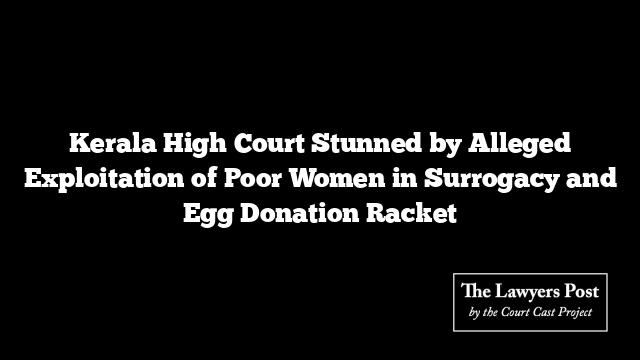The Kerala High Court has raised alarm over what it described as a disturbing pattern of exploitation of women from impoverished backgrounds, allegedly being lured into surrogacy and egg donation under the guise of Assisted Reproductive Technology (ART).
A Division Bench comprising Justices Devan Ramachandran and MB Snehalatha said it was “shocked” by the facts of a case that hinted at a possible human exploitation network operating under the cover of ART services.
“ART has been a medical revolution globally,” the Bench observed, “but in markets like ours, it appears to have taken a dark turn — preying on vulnerable women and, equally, on desperate couples yearning for children.”
The judges expressed deep concern that women with little education or support are being enticed with promises of money to act as surrogates or egg donors. “The power imbalance here is stark,” the Court noted, warning that such arrangements often occur in secrecy, leaving women with no control and little understanding of the risks involved.
The Bench remarked that the situation reflected “a complete breach of ethical standards,” pointing out that the exploitation extends beyond the women — even childless couples are drawn into a web of deceit and manipulation by middlemen who profit from both sides.
The case came before the court through a habeas corpus plea filed by an organisation named ART Bank, which sought the release of several women allegedly being held by State authorities at Santhi Bhavan, a government-run shelter home. The organisation claimed the women were voluntary egg donors.
However, the State and Santhi Bhavan’s representatives countered that the women were victims of trafficking, brought to Kerala under false pretenses for surrogacy and egg donation. Officials told the court that both the Health Department and Police were investigating the organisation and similar activities across the State.
The judges expressed disbelief that such exploitation could occur in Kerala, a State renowned for its literacy and progressive outlook. “We are aghast that such tendencies are allowed to thrive here,” the Court said, directing the authorities to take decisive steps to prevent recurrence.
The Bench ordered police protection for the women and adjourned the matter till October 10, instructing officials to file action-taken reports by then.
The court’s message was unmistakable — innovation in medicine must never come at the cost of humanity.





